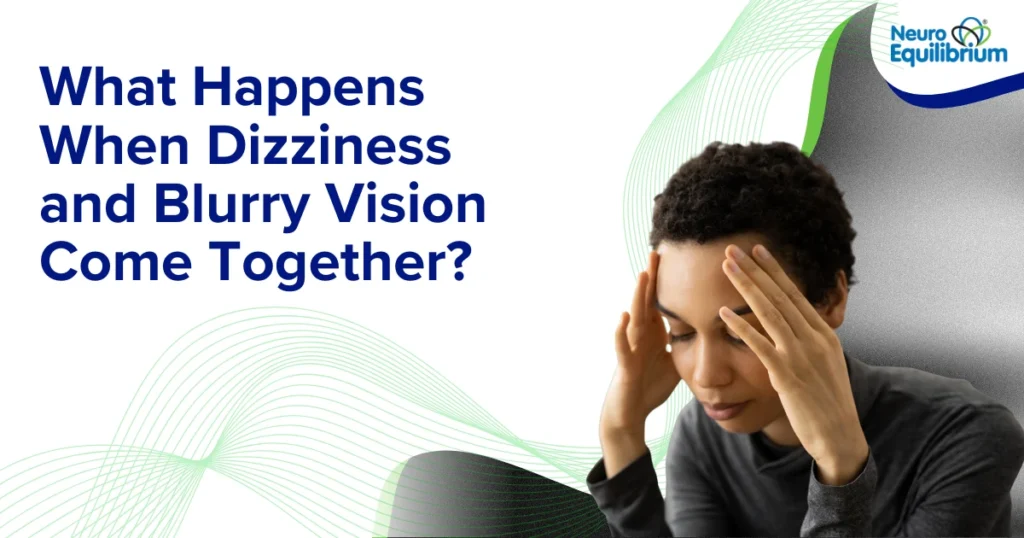Both of these things, dizziness and blurred vision, can be quite frightening. Your sense of balance is a complicated process, and it depends on the input of your eyes, your inner ear (which is referred to as the vestibular system), and your brain. When these two symptoms show up hand-in-hand, it could be a sign of anything from a minor issue to something more serious that needs immediate medical attention. That’s why getting it checked out is so important.
What to Expect from This Information
If you’re looking into why you feel off-balance or dizzy, especially when you don’t feel particularly tired or weak, you’re likely looking for clear explanations. This blog will explain to you the potential causes, both general and severe. It also tells the differentiation between the unsteadiness due to inner ear and neurological problems, the symptoms to look and when to consult a physician. You will also be told about typical tests and therapies.
Signs to Watch For
It helps to know how to describe what you’re feeling. Are you experiencing a spinning sensation (vertigo), feeling like you’re floating, swaying, being pulled to one side, or lightheaded? Does it feel like the ground is shifting beneath you? These feelings are often quite different from the fatigue or generalized muscle weakness you might associate with physical exertion. Noticing these patterns can help you explain your symptoms to a doctor.
Know More About
- Neck Pain Causes That Can Lead to Dizziness – Should You Be Worried?
- Is It Anxiety or an Ear Problem? How to Tell What’s Causing Your Dizziness
- How to Find the Right Dizziness Doctor for You
1. Inner Ear Problems (Vestibular System)
A large role in balance is played by your inner ear. These are some of the frequent inner ear causes of unsteadiness:
- Benign Paroxysmal Positional Vertigo (BPPV): This is the condition that occurs when calcium crystals of your inner ear become loose and shift to the wrong location. This brings about brief, abrupt spinning feelings when you turn your head in some direction such as when coming out of bed or turning around.
- Meniere’s Disease: It is a chronic inner ear condition caused by the build-up of fluid pressure in the inner ear. It typically leads to repeated vertigo attacks, hearing loss, tinnitus (ringing in the ears), and a sensation of fullness or pressure in the affected ear
- Vestibular Neuritis/Labyrinthitis: They are caused by bacterial or viral infection of the balance nerve. They may cause severe vertigo, and there is often nausea and occasionally hearing issues. When labyrinthitis is not addressed in time, it may result in permanent hearing impairment.
- Vestibular Migraine: You can become dizzy or feel dizzy with or without a headache. You might also be hypersensitive to movement, noise or bright light. Triggers may include stress and screen time.
- Acoustic Neuroma: This is a rare non cancerous, slow growing tumor that affects your hearing and balance along the nerve linking your inner ear and your brain. It may lead to slow hearing loss and dizziness. There have been instances where it can indirectly interfere with vision in case it becomes large.
2. Brain and Nerve Problems
In other cases, the unsteadiness is caused due to brain issues. Although not as common, these may be more serious:
- Stroke, Multiple Sclerosis (MS), or Tumors: Stroke, Multiple Sclerosis (MS), or Tumors may impact the areas of your brain that govern sensation of balance or what you see. Thus, the blurred vision and dizziness might be one of the first indications of a more severe neurological disorder.
- Epilepsy (in children): In exceptional instances, vertigo can be the result of epilepsy in children.
You should not panic, though it is advisable to visit a doctor in case your unsteadiness is accompanied by such symptoms as a double vision, speech difficulties, or numbness.

3. General Health and Medical Reasons for Unsteadiness
Some causes of unsteadiness aren’t directly related to your ear or brain but still affect your balance:
- Postural Hypotension: This is where your blood pressure decreases very rapidly on standing up causing dizziness or loss of balance.
- Side effects of medications: Dizziness or unsteadiness may be a side effect of many medications, particularly when you are taking a variety of medications. These are sedatives, hypertensive drugs, some allergy or anti-allergy medication, and some antibiotics.
- Undiagnosed Diseases: Infections, dehydration, anemia or heart issues may leave you generally unwell and add to the unsteadiness, occasionally simulating weakness in the muscles.
- Vision or Hearing Loss: Lack of vision (due to cataracts) or hearing loss may also scramble your equilibrium, particularly as you grow older.
- Cognitive Issues in Aging: Memory loss or reaction time makes the older people prone to falls.
4. Psychological and Lifestyle Factors
Balance problems may be worsened by anxiety, fear of falling, and social withdrawal. When you have been dizzy over some time, the psychological factors may develop a cycle that makes dizziness a long-term problem.
5. Nutrition
The lack of some nutrients such as Vitamin D, B12, Magnesium can interfere with nerve health, brain functions and blood pressure, which could contribute to the problem of balance. These deficiencies often do not cause balance issues, but they aggravate them.
6. Muscle Weakness vs. Inner Ear/Brain Causes: Making Sense of the Difference
General weakness can be easily mistaken as issues with your balance system. Muscle weakness is physical and it usually occurs gradually. You may have a problem lifting things, climbing stairs or generally feeling physically tired. Light headedness due to ear or brain problems is, however, abrupt, provoked by positional changes, or accompanies other sensory complaints such as dizziness or spinning that do not usually occur with muscle weakness. During diagnosis, a doctor can assist in differentiating them.
Here’s a quick overview of how these two causes differ:
| Feature | Unsteadiness due to Muscle Weakness | Unsteadiness due to Vestibular/Neurological Causes |
| Onset | Often gradual, worsening over time | Can be sudden or episodic, often triggered by certain movements |
| Sensation | Feeling of physical weakness, difficulty lifting/moving | Spinning, swaying, floating, lightheadedness, disorientation |
| Associated Symptoms | Muscle fatigue, pain, difficulty with physical tasks | Nausea, vomiting, hearing changes, vision issues, headache |
| Triggers | Prolonged activity, standing, general exertion | Head movements, changes in position, visual stimuli, stress, noise/sound stimuli |
| Improvement | Rest, strengthening exercises modification in diet | Repositioning maneuvers, specific medications, balance rehab |
When to Be Concerned?
It’s important to know when your dizziness and blurry vision might signal a serious problem that needs immediate attention.
| When to Be Concerned (Seek Emergency Care) | When Not to Be Immediately Concerned (Still See a Doctor) |
| Sudden, severe onset of dizziness and blurry vision | Dizziness and blurry vision that are mild and come and go |
| Accompanied by numbness or tingling | Symptoms that are clearly linked to specific triggers (e.g., getting up too fast) |
| Accompanied by slurred speech or difficulty speaking | Gradual onset of symptoms over weeks or months |
| Sudden difficulty walking or loss of coordination | Symptoms that improve with rest or hydration |
| Sudden loss of vision in one or both eyes | Symptoms that are familiar and have been diagnosed before (e.g., BPPV) |
| Severe headache | No other neurological symptoms present |
| Double vision that is new | vertigo associated dizziness. |
| Weakness or paralysis on one side of the body | dizziness observed on specific body movements, such as turning etc. |
Diagnosis and Treatment
Getting a detailed medical evaluation is very important. Your doctor might suggest tests like:
- Videonystagmography (VNG), which checks your eye movements to assess inner ear function.
- Audiometry: Tests your hearing to detect any inner ear-related issues.
- Posturography: Analyzes your posture and balance under different conditions.
- MRI or CT Scan: In rare cases, used to rule out brain-related causes like stroke or tumors.
- Blood Pressure Monitoring: Identifies drops in blood pressure that can lead to dizziness.
- Comprehensive Eye Exam: To rule out vision-related balance problems.
- Blood Tests: To check for infections, vitamin deficiencies, or other underlying conditions.
The treatment will depend entirely on what’s causing your symptoms:
- Vestibular rehab therapy for problems with your balance nerves.
- Migraine management, which includes lifestyle changes and medication.
- Vision correction or eye surgery (for conditions like cataracts or glaucoma).
- Managing underlying health issues like blood sugar or blood pressure.
What You Can Do at Home?
While you’re waiting to see a doctor, or as part of your treatment, here are some things you can do at home:
- Rest and drink plenty of fluids during dizzy spells.
- Avoid sudden changes in your posture.
- Reduce screen time if you notice that visual triggers make your symptoms worse, especially your blurry vision.
- Keep a symptom diary to report accurately to your doctor.
The NeuroEquilibrium Advantage
Unexplained dizziness and blurred vision are signs that you should not overlook, particularly when you or a loved one experiences the situation. You need to make a proper diagnosis so that you receive the appropriate care.
NeuroEquilibrium Clinics is the largest and most progressive chain of vertigo and balance disorder specialty clinics in India. They are equipped with state-of-the-art diagnosis equipment and have more than 220+ clinics, as well as highly trained neuro-otologists who have been trained on the latest methods. Their specialized tests of the vestibular functions, virtual reality-based rehabilitation program and system can assist in defining the cause of your symptoms with certainty, giving you the confidence to restore your stability and quality of life.
Call NeuroEquilibrium today to book a consultation and be on your way to clear vision and a steady you.
Sources
- Barden A. (2021). 9 Causes of Dizziness and Blurred Vision. AllAboutVision. https://www.allaboutvision.com/conditions/symptoms/blurry-vision/dizziness-blurred-vision/ (All About Vision)
- “Sudden Blurred Vision and Dizziness.” Fyzical. https://fyzical.com/blog/Sudden-Blurred-Vision-and-Dizziness (fyzical.com)
- “Can vision problems cause dizziness?” Medical News Today (2024). https://www.medicalnewstoday.com/articles/can-vision-problems-cause-dizziness (Medical News Today)
- “Why am I having sudden blurred vision and dizziness when standing up?” UbieHealth (2025). https://ubiehealth.com/doctors-note/sudden-blurred-vision-dizziness-standing (Ubie Symptom Checker)
- “Dizziness, vertigo and balance disorders.” Better Health Victoria. https://www.betterhealth.vic.gov.au/health/conditionsandtreatments/dizziness-and-vertigo (Better Health Channel)
- “Blurred Vision, Dizziness, Feeling Faint And Floating Spots …” MedicineNet. https://www.medicinenet.com/blurred_vision_dizziness_feeling_faint_and_eye_floaters/multisymptoms.htm (MedicineNet)
- “Blurred vision – causes, symptoms and treatment.” Healthdirect (Australia). https://www.healthdirect.gov.au/blurred-vision (Healthdirect)
Can dizziness and blurry vision happen at the same time?
Indeed, they may accompany, as a result of problems with the inner ear, the brain, and the circulation, and indicate dysfunctions of the balance system.
Is it serious if I suddenly feel dizzy and my vision blurs?
Sudden symptoms may indicate a serious issue like a stroke or nerve problem. Seek emergency care if severe or paired with other symptoms.
What conditions cause both dizziness and blurred vision?
Some of the most common causes are BPPV, vestibular migraine, Meniere disease, low blood pressure, and neurological disease.
How can I tell if it’s muscle weakness or a balance issue?
The onset of muscle weakness develops over time and is physically felt whereas imbalances lead to uncontrollable lightheadedness or spinning.
What tests are done for dizziness and blurred vision?
Doctors can conduct balance tests, eye examination, blood pressure, and rarely brain scans (MRI/CT) in order to determine the root cause.
















